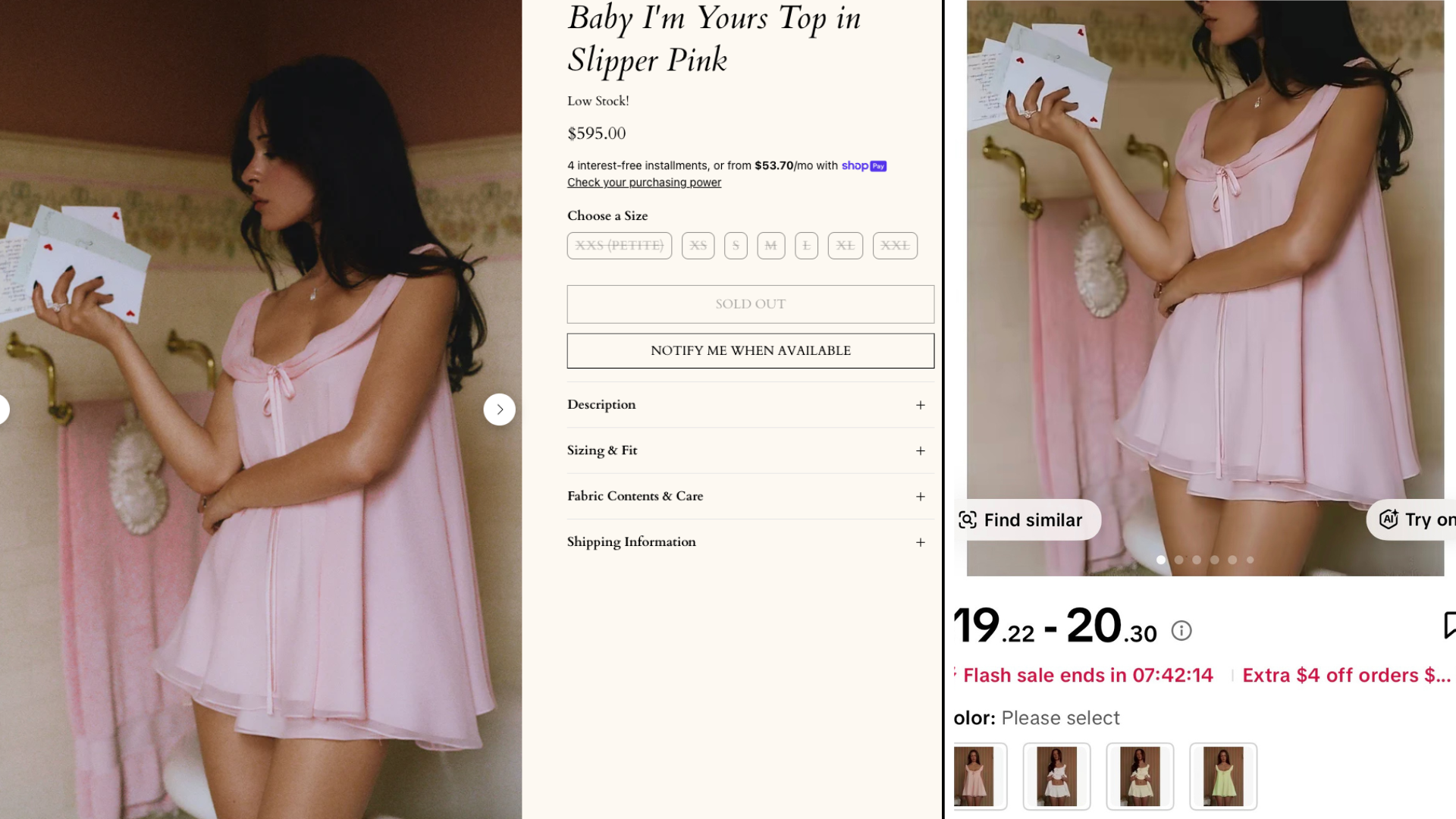Beyond the Law: Why Mirror Palais Can't Stop Fast Fashion From Stealing Its Designs
“I’m one of the world’s biggest fast fashion designers, and unfortunately, this is happening completely against my own will.” Marcelo Gaia, the founder and designer of the often ultra-viral romantic luxury womenswear line, Mirror Palais, opened his recent TikTok with this line. The video cuts to flashing screenshots of his designs sold by House of CB, Oh Polly, Amazon, and TikTok Shop.
Anyone who follows Mirror Palais recognizes that his designs get consistently ripped off by fast fashion brands for a fraction of the price. Gaia has the gift of designing the quintessential romantic, ethereal, sexy, feminine pieces that go viral like wildfire. A Midas Touch, but as we know, turning everything you touch into gold has a downside. In Gaia’s case, his ideas are being co-opted and exploited without his consent, “to fuel overconsumption that is killing our planet,” as he puts it. Ouch.
How is this legal?
Some comments under the post told Gaia to “get a lawyer, babes.” Reading it kind of made me cringe, especially knowing that fashion designs aren’t legally protected in the way you might expect. While repeated design elements can be protected under trade dress, the overall construction of a garment is considered primarily functional as opposed to ornamental or art, so there are few legal barriers to copying designs.
The legal void isn't inherently evil. Steve Madden recently had a viral moment for being a designer for the people, Robin Hood-esque, adapting trendy designer-inspired shoes at more accessible price points. This trickle-down-trend-cycle plays an important role: it democratizes fashion and keeps trends moving. It's probably why lawmakers have been reluctant to interfere.
So why does Steve Madden get praised while Mirror Palais gets pitied?
They’re essentially opposite players in the same situation. The difference is in the scale of harm.
Steve Madden adapts luxury trends, but it's a more curated process targeting specific styles. His buyers are making a deliberate choice for accessible, but still high-quality, designer-inspired shoes they'll wear repeatedly. Meanwhile, Mirror Palais has become a primary target for fast fashion mills that systematically harvest viral designs and mass-produce cheaper versions off a conveyor belt. TikTok Shop and Amazon buyers are often impulse-purchasing pieces for a few photos or a one-time event.
In his video, Gaia calls out the everyday consumers and TikTok micro-influencers buying and promoting knockoffs of his designs. But the problem isn’t lost sales, it’s the perpetuation of a system that prioritizes cheapness over everything else: fair labor, environmental impact, creative integrity, and freedom of expression.
One girl posted an unofficial response video essentially arguing that yeah, it’s bad, but most of her closet is secondhand vintage anyway, and sometimes she just wants a cheap trendy item because she’s just a girl. People were eating her up in the comments, but I know without a doubt that so many others agree with that thinking: “It’s not that bad, everyone does it.”
Gaia brings up a silk night set, of which he sold 35 units of the top piece and 18 units of the bottom piece, separately. A polyester version of the same set sold over 5,000 pairs (over 10,000 individual pieces) on TikTok shop. Each of these units represents the normalcy of this practice. What’s worse is the product photos featured on TikTok are directly taken from Mirror Palais’s Website. [pictured below]
Just like most people who buy Steve Madden jelly flats for $59 were probably never in the market for The Row’s $890 version, most people buying a $20 polyester pajama set off TikTok shop were likely never going to pay $1,000 for the original design from Mirror Palais; it’s not the same market.
The real question isn't whether girls “deserve to be trendy”. It's why we've created a system where looking current is a competing value with human, environmental, and creative rights.
Expressing his creative voice, for Gaia, comes with the caveat that it potentially means contributing to a system that betrays his values. We’ve created a world where exercising your right to creative expression can inadvertently enable violations elsewhere.
The Mirror Palais paradox reveals something broken in how we've structured creativity, commerce, and ethics. We've built a world where looking current justifies participating in exploitation, all within a legal framework designed to encourage innovation but currently unable to prevent abuse.

